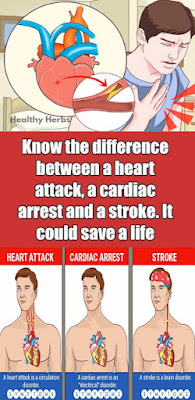Heart attack, stroke, and cardiac arrest are all serious conditions requiring urgent medical attention. However, there is a lot of ambiguity among many people. In fact, these health diseases are one of the most common conditions that people often fail to recognize.
But all these conditions differ in symptoms, severity, and background. Therefore, being able to distinguish these 3 terms is extremely crucial, in order to know how to help a patient and how to prevent any of the conditions from becoming more severe.
1. Heart Attack
This represents a circulation disorder. In fact, when the blood flow is blocked to a certain part of the heart muscle and is left untreated immediately, it could kill the organ.
It is important to know that if a person has a heart attack, his/her heart continues beating.
2. Cardiac Arrest
This condition is also known as an ‘electrical’ disorder.
Sudden cardiac arrest occurs suddenly and often without warning. When someone’s electrical activity in the heart is disrupted, the blood flow immediately stops moving through the body. When a cardiac arrest happens, the heart stops working.
3. Stroke
A stroke is also caused by interruption of blood flow, but it affects the brain tissue rather than the heart muscle. Mainly, strokes are divided into three types:
- Ischemic stroke– When the artery transporting oxygen-rich blood to the brain experiences a blockage it causes brain cells to die.
- Transient ischemic attack (known as a mini-stroke) – Occurs when there is a short artery blood flow to the brain. The symptoms mostly resolve without residual deficits.
- Hemorrhagic stroke – This represents a ruptured artery inside the brain cells, which starts bleeding into the brain.
Here are the most common symptoms that can indicate these 3 health conditions:
Heart Attack Symptoms:
- Chest pain — Burden inside the chest, repeats every few minutes
- Body pain- Especially in the neck, back, abdomen, jaw, arms (especially the left one)
- Cold sweating
- Coughing
- Dizziness
- Anxiety
- Wheezing and shallow breathing
- Nausea
Cardiac Arrest Symptoms:
- Weakness
- Fainting
- Blackout
- Chest pain
- Sudden collapse
- Excessive palpitation
- Weak or no pulse
- Shortage of breath
- Shallow breaths
- Little or no responsiveness
Stroke Symptoms:
- Nausea
- Impaired vision and double vision
- Headache
- Blurred speech
- Face, arm, or leg numbness
- Mental disorientation
- Distraction and loss of concentration
- Excessive sweating
- Walking issues and dizziness
